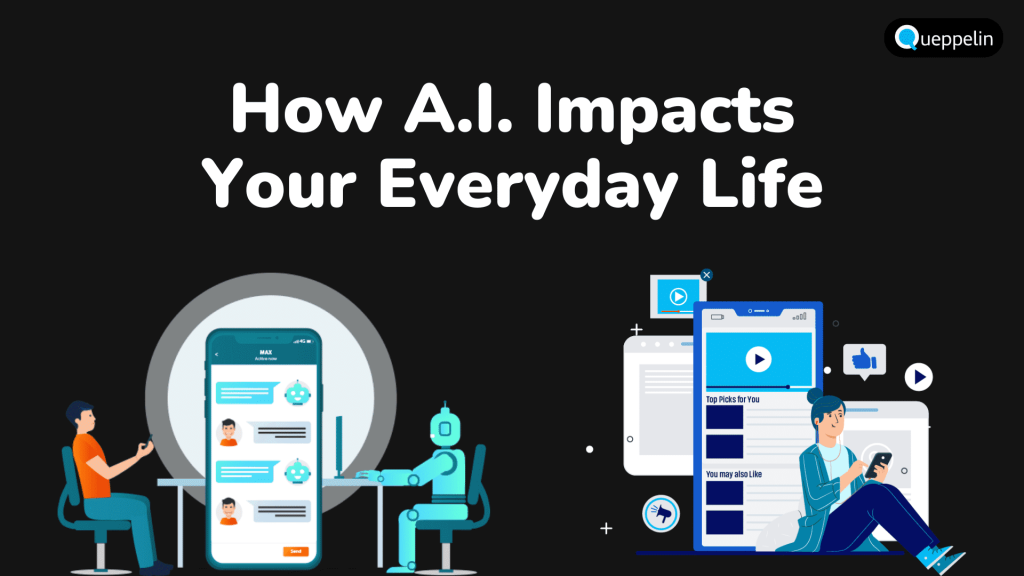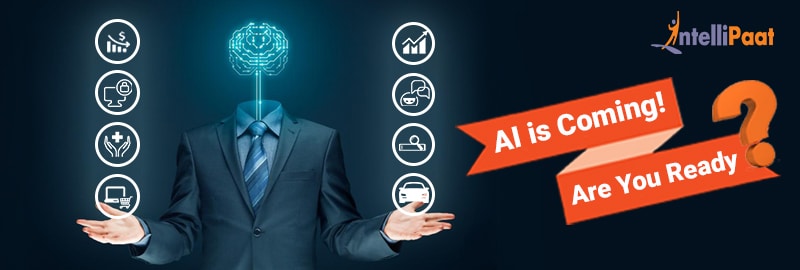Artificial intelligence will profoundly impact your life, changing the way you live, work, and interact. As AI technology continues to advance exponentially, it will revolutionize various industries, automate repetitive tasks, and enhance decision-making processes.
This transformative technology will enable personalized experiences, improve efficiency, and drive innovation across numerous sectors, from healthcare and finance to transportation and manufacturing. With AI, you can expect improved healthcare diagnostics, self-driving cars, smart home automation, virtual assistants, and more.
As AI becomes increasingly integrated into our daily lives, it presents both opportunities and challenges, leading to a future that is vastly different than what we experience today.

Credit: www.queppelin.com
Table of Contents
The Rise Of Artificial Intelligence
Artificial Intelligence (AI) is rapidly reshaping numerous aspects of our lives. With the ability to analyze vast amounts of data and make decisions without human intervention, AI is revolutionizing industries and transforming traditional processes. The impact of AI is far-reaching, from enabling automation in businesses to enhancing daily tasks and services. Here’s a closer look at how the rise of AI is set to shape our lives in the near future.
Impact On Daily Tasks
AI is increasingly integrated into our daily lives, influencing the way we perform routine tasks. From personalized digital assistants like Siri and Alexa that organize our schedules and provide helpful suggestions, to automated customer service chatbots that streamline interactions, AI simplifies and enhances various daily activities. With the advent of self-driving cars, AI is even reshaping transportation, promising safer and more efficient commutes.
Ai In Industries
In industries, AI is driving significant transformation. With machine learning algorithms and predictive analytics, businesses can intelligently forecast trends, optimize production, and improve overall efficiency. Healthcare is leveraging AI for diagnosis and treatment recommendations, while finance is using AI for fraud detection and risk management. The manufacturing sector is benefitting from AI-powered robotics, leading to increased automation and precision in production processes.
Challenges And Concerns
Artificial Intelligence (AI) presents exciting opportunities but also brings about a host of challenges and concerns that need to be addressed.
Ethical Issues
One major concern revolves around the ethical implications of AI technologies in various aspects of life.Job Displacement
Another pressing issue is the potential job displacement resulting from the automation and AI-driven technologies.AI raises ethical questions regarding data privacy and biases that need careful consideration.
Job displacement due to AI automation poses a significant challenge to the current workforce.
Ensuring AI is developed and deployed in an ethical manner is crucial to address these concerns.
Job roles might shift or disappear with the advancement of AI, impacting employment opportunities.
Benefits Of Ai Integration
Discover how AI integration is revolutionizing daily life by streamlining tasks and enhancing efficiency. Experience personalized recommendations, improved healthcare diagnostics, and advanced automation through Artificial Intelligence’s transformative impact.
Enhanced Efficiency
AI integration offers several benefits that can enhance efficiency in various aspects of our lives. By automating repetitive tasks, AI can save us time and energy, allowing us to focus on more important and complex matters. Moreover, AI-powered systems can analyze vast amounts of data at an incredibly fast speed, enabling us to make informed decisions quickly and accurately. This enhanced efficiency can streamline workflows, increase productivity, and optimize resource allocation. AI also has the potential to revolutionize industries such as manufacturing and logistics. Intelligent machines can be programmed to perform tasks with precision and accuracy, reducing human error and operational costs. By leveraging AI technology, companies can improve their production processes and deliver higher quality products and services.Improved Healthcare
One of the most exciting applications of AI is in the field of healthcare. The integration of AI has the potential to transform medical diagnosis, treatment, and patient care. With AI algorithms capable of analyzing medical images, doctors can detect and diagnose diseases more accurately and at an early stage. AI-powered robots can assist surgeons during complex procedures, enhancing surgical precision and reducing the risk of complications. Virtual nurses and chatbots can provide personalized and timely healthcare advice to patients, improving access to medical information. AI can also contribute to drug discovery and development by sifting through massive datasets and identifying potential treatments more efficiently. This not only speeds up the process but also reduces the cost associated with bringing new drugs to market. Overall, the integration of AI in healthcare can lead to improved patient outcomes, reduced healthcare costs, and enhanced access to medical services for individuals around the world.
Credit: www.europarl.europa.eu
Ai And Personal Privacy
Artificial Intelligence (AI) has rapidly become a part of our everyday lives, impacting various aspects including personal privacy. With the advancement of AI technology, concerns about data security and surveillance are becoming more significant. It is crucial to understand the implications of AI on personal privacy to navigate the ever-evolving digital landscape.
Data Security
Ensuring data security has become a pressing issue in the age of AI. As AI systems continue to gather and analyze vast amounts of personal data, there is a growing need for robust security measures to safeguard this information. In order to protect sensitive data from falling into the wrong hands, organizations and individuals must prioritize data encryption, access control, and regular security audits. Adopting best practices helps build trust and confidence in the AI systems we interact with on a daily basis.
Surveillance
AI-powered surveillance raises concerns about invasion of privacy. Advances in facial recognition technology have opened up possibilities for increased surveillance in public spaces. On one hand, this technology promotes safety and security, aiding in the identification of potential threats. On the other hand, it raises ethical questions about the extent to which our privacy is compromised. Striking a balance between security measures and the protection of individual rights is crucial. Transparency and regulation play a key role in ensuring that surveillance systems are used responsibly and for the benefit of society.
Code Example: Implementing Data Encryption
Generate an encryption key
$key = random_bytes(32);
Encrypt sensitive data
$cipher = 'AES-256-CBC';
$ivLength = openssl_cipher_iv_length($cipher);
$iv = random_bytes($ivLength);
$encryptedData = openssl_encrypt($data, $cipher, $key, 0, $iv);
Store the encrypted data securely
$encryptedDataWithIV = $iv . $encryptedData;
Decrypt the data when needed
$decryptedData = openssl_decrypt($encryptedData, $cipher, $key, 0, $iv);Summary:
- Data security is crucial in the AI-driven era, necessitating strong encryption and access control measures.
- Facial recognition and surveillance technologies powered by AI raise ethical concerns about privacy invasion.
- Regulations and transparency are essential to ensuring responsible and balanced use of surveillance systems.
Preparing For The Ai Future
Artificial Intelligence (AI) is revolutionizing every aspect of our lives, from the way we work to how we interact with technology. Understanding the impact of AI on our future is crucial for adapting successfully to this rapidly evolving technological landscape.
Education And Skill Development
Embracing lifelong learning is essential for staying relevant in a world where AI is increasingly integrated into various industries. Upskilling and reskilling programs can help individuals acquire new capabilities needed to work alongside AI technologies.
Adapting To Change
Fostering a growth mindset is key to navigating the changes brought about by AI. Being open to new opportunities and willing to adapt will enable individuals to thrive in a dynamic and AI-driven environment.

Credit: intellipaat.com
Frequently Asked Questions For How Will Artificial Intelligence Affect Your Life?
How Will Artificial Intelligence Change My Life?
Artificial intelligence will dramatically transform our lives by improving efficiency, accuracy, and convenience in various areas, such as healthcare, transportation, and daily tasks. It will enhance decision-making, automate routine tasks, and enable personalized experiences, ultimately making our lives more convenient and productive.
How Is Artificial Intelligence A Threat To Human Life?
Artificial intelligence poses a threat to human life due to its potential for unintended consequences and misuse. Its advanced capabilities can lead to job displacement, privacy breaches, and even the development of autonomous weapons. It is crucial to regulate and develop AI responsibly to ensure its benefits outweigh the risks.
How Does Ai Affect Our Sense Of Self?
AI impacts our sense of self by blurring boundaries between human and machine, altering identity perception.
Conclusion
As artificial intelligence advances, expect significant impacts on daily life and industries. Adapting to AI’s evolution is crucial for future success and understanding its implications. Stay informed and embrace the opportunities AI brings to transform our world. Prepare for an AI-driven future that will shape how we live and work.

Leave a Reply